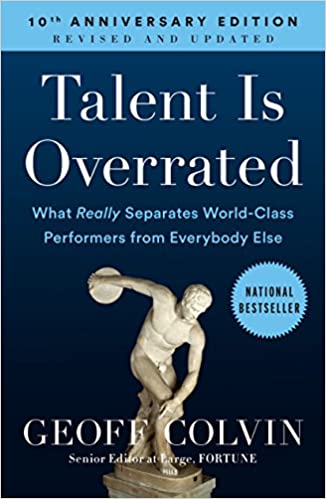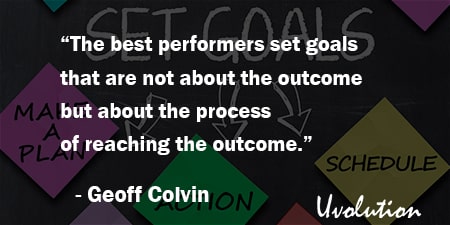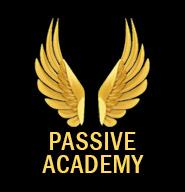Talent Is Overrated by Geoff Colvin
The Book in 1 Sentences
Talent Is Overrated: What Really Separates World-Class Performers from Everybody Else
“We tend to think we are forever barred from all manner of successes because of what we were or were not born with. The range of cases in which that belief is true turns out to be a great deal narrower than most of us think. The roadblocks we face seem to be mostly imaginary.” ~ Geoff Colvin
5 BIG Ideas
1. It takes deliberate practice for 10 years or 10,000 hours to achieve a great performance.
2. After knowing what you want, DO IT!
3. Comfort, Learning and Panic Zone! Stay in “Learning Zone”.
4. “Everyone who has achieved exceptional performance has encountered terrible difficulties along the way. There are no exceptions.”
5. Anyone can become better!
Talent Is Overrated Summary
1. The Ten-Year Rule
“The phenomenon seems nearly universal. In a famous study of chess players, Nobel Prize winner Herbert Simon and William Chase proposed “the ten year rule,” based on their observation that no one seemed to reach the top ranks of chess players without a decade or so of intensive study, and some required much more time.
Even Bobby Fischer was not an exception; when he became a grand master at age sixteen, he had been studying chess intensively for nine years. Subsequent research in a wide range of fields has substantiated the ten-year rule everywhere the researchers have looked.
In math, science, musical composition, swimming, X-ray diagnosis, tennis, literature—no one, not even the most “talented” performers, became great without at least ten years of very hard preparation.
If talent means that success is easy or rapid, as most people seem to believe, then something is obviously wrong with a talent-based explanation of high achievement.”
So, what makes a great performance in ANYTHING?!
It’s deliberate practice for 10 years or 10,000 hours. That’s it.
If you do the math, you’ll find that 10,000 hours equal to about 4 hours a day, 5 days a week, 50 weeks a year. For 10 years.
2. Mozart Did the Work
“Wolfgang’s first four piano concertos, composed when he was eleven, actually contain no original music by him. He put them together out of works by other composers.
He wrote his next three works of this type, today not classified as piano concertos, at age sixteen; these also contain no original music but instead are arrangements of works by Johann Christian Bach, with whom Wolfgang had studied in London...
Mozart’s first work regarded today as a masterpiece, with its status confirmed by the number of recordings available, is his Piano Concerto No. 9, composed when he was twenty-one.
That’s certainly an early age, but we must remember that by then Wolfgang had been through eighteen years of extremely hard, expert training.”
Mozart put in eighteen years of training before he created something truly extraordinary! Got this?!
It’s not about the talent!
“The New Yorker’s music critic, Alex Ross, sums up much of the recent scholarship on the Miracle of Salzburg: “Ambitious parents who are currently playing the ‘Baby Mozart’ video for their toddlers may be disappointed to learn that Mozart became Mozart by working furiously hard.””
3. Know What You Want to Do
“Step one, obvious yet deserving a moment’s consideration, is knowing what you want to do. The key word is not what, but knowing. Because the demands of achieving exceptional performance are so great over so many years, no one has a prayer of meeting them without utter commitment.
You’ve got to know what you want to do, not suspect it or be inclined toward it or be thinking about it.”
It would be really hard to put in the work and effort without actually knowing the real goal, your target, the outcome to achieve after these 10 years!
Think about that… take your time…
What do you want to do?
4. After Knowing What You Want, DO IT!
There was a research on violinists at the Music Academy of West Berlin where professors were asked to rate their students into three basic groups:
1) students with a chance to go on to become international soloists;
2) students not quite that good but still pretty awesome;
and 3) students who would likely go on to become music teachers.
Researchers got all kinds of data on these students.
Colvin says: “By age eighteen, the violinists in the first group had accumulated 7,410 hours of lifetime practice on average, versus 5,301 hours for violinists in the second group and 3,420 hours for those in the third group. All the differences were scientifically significant.”
For sure, all the students knew that practicing by themselves was the MOST important thing they could do to improve their skills. But as you see, not all of them did what they really knew and wanted!
As Colvin says: “They all knew it, but they didn’t all do it.”
You want something?
Go for it!
5. Practice & Sleep More!
“Practice is so hard that doing a lot of it requires people to arrange their lives in particular ways. The two top groups of violinists did most of their practicing in the late morning or early afternoon, when they were still fairly fresh.
By contrast, violinists in the third group practiced mostly in the late afternoon, when they were more likely to be tired.
The two top groups differed from the third group in another way: They slept more. They not only slept more at night, they also took far more afternoon naps. All that practicing seems to demand a lot of recovery.”
How about you?
How do you start your days? And how often do you sleep?
6. Deliberate practice
“Deliberate practice is characterized by several elements, each worth examining. It is activity designed specifically to improve performance, often with a teacher’s help; it can be repeated a lot; feedback on results is continuously available; it’s highly demanding mentally, whether the activity is purely intellectual, such as chess or business-related activities, or heavily physical, such as sports; and it isn’t much fun.”
“The work is so great that it seems no one can sustain it for very long. A finding that is remarkably consistent across disciplines is that four or five hours a day seems to be the upper limit of deliberate practice, and this is frequently accomplished in sessions lasting no more than an hour to ninety minutes.”
7. Comfort, Learning and Panic Zone
“Noel Richy, a professor at the University of Michigan business school and former chief of General Electric’s famous Crotonville management development center, illustrates the point by drawing three concentric circles.
He labels the inner circle “comfort zone,” the middle one “learning zone,” and the outer one “panic zone.” Only by choosing activities in the learning zone can one make progress.
That’s the location of skills and abilities that are just out of reach. We can never make progress in the comfort zone because those are the activities we can already do easily, while panic-zone activities are so hard that we don’t even know how to approach them.
Identifying the learning zone, which is not simple, and then forcing oneself to stay continually in it as it changes, which is even harder—these are the first and most important characteristics of deliberate practice.”
8. Great Innovations Take Time!
“The greatest innovators in a wide range of fields—business, science, painting, music—all have at least one characteristic in common: They spent many years in intensive preparation before making any kind of creative breakthrough.
Creative achievement never came suddenly, even in those cases in which the creator later claimed they did.
Whether it was the transistor or the Beatles’ Sgt. Pepper album or the cell phone or Picasso’s Les Demoiselle d’Avignon, it always followed a long earlier period of extremely hard work, and in most cases the creative products themselves were developed over a significant period.
Great innovations are roses that bloom after long and careful cultivation.”
“... the innovator seems driven to learn as much as possible about the domain, to improve, to drive himself or herself beyond personal limits and eventually beyond the limits of the field.”
9. Be Willing to Fall!
“A study of figure skaters found that sub-elite skaters spent lots of time working on the jumps they could already do, while skaters at the highest levels spent more time on the jumps they couldn’t do, the kind that ultimately win Olympic medals and that involve lots of falling down before they’re mastered.”
And remember that: “The most eminent creators are consistently those who have immersed themselves utterly in their chosen field, have devoted their lives to it, amassed tremendous knowledge of it, and continually pushed themselves to the front of it.”
10. What Do You Really Believe?
“What do you really want? And what do you really believe? ...
The second question is more profound. What do you really believe? Do you really believe that you have a choice in the matter? Do you believe that if you do the work, properly designed, with intense focus for hours a day and years on end, your performance will grow dramatically better and eventually reach the highest levels? If you believe that, then there’s at least a chance you will do the work and achieve great performance.
But if you believe that your performance is forever limited by your lack of a specific innate gift, or by a lack of general abilities at a level that you think must be necessary, then there’s no chance at all that you will do the work.”
Carol Dweck’s great book “Mindset” talks about two different perspectives we can have: a “fixed mindset” or a “growth mindset.” Read Mindset summary
She says: “Believing that your qualities are carved in stone—the fixed mindset—creates an urgency to prove yourself over and over. If you have only a certain amount of intelligence, a certain personality, and a certain moral character—well, then you’d better prove that you have a healthy dose of them. It simply wouldn’t do to look or feel deficient in these most basic characteristics.”
And she also says “The growth mindset is based on the belief that your basic qualities are things you can cultivate through your efforts. Although people may differ in every which way—in their initial talents and aptitudes, interests, or temperaments—everyone can change and grow through application and experience.”
So, what do you really want? And what do you really believe?
And remember that: “Everyone who has achieved exceptional performance has encountered terrible difficulties along the way. There are no exceptions.”
11. Anyone Can Become Better
“The evidence offers no easy assurances. It shows that the price of top-level achievement is extraordinarily high. Perhaps it’s inevitable that not many people will choose to pay it.
But the evidence shows also that by understanding how a few become great, anyone can become better. Above all, what the evidence shouts most loudly is striking, liberating news: that great performance is not reserved for the pre-ordained few. It is available to you and to everyone.”
Whether we feel called to dedicate our lives to achieving greatness or simply to become better and better human beings, as Colvin tells us: “what the evidence shouts most loudly is striking, liberating news: that great performance is not reserved for the pre-ordained few.”
Great performance is available to everyone, just put in the work and be willing to pay the price! You’ll get it! 🙂
That was my QUICK Talent Is Overrated summary. If you’re interested, get your copy. There is a HUGE amount of wisdom and life-changing ideas in this book, and we’ve only touched on a tiny bit of it.
Buy The Book: Talent Is Overrated by Geoff Colvin

GET Blinkist 7 Days FREE Trial
3000+ Book Summaries
(Audio and Text)





